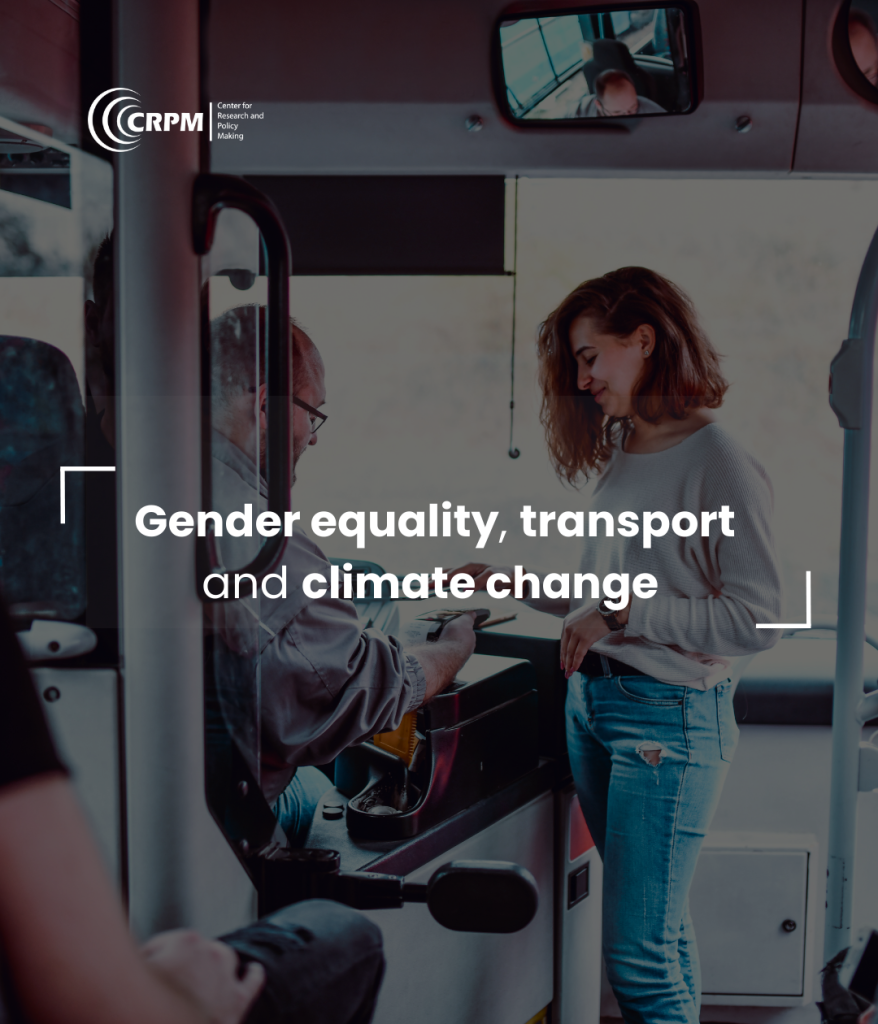Read this column in macedonian.
Transportation is not just a means of getting from one place to another- it is a critical factor shaping economic participation, social inclusion, and environmental sustainability. However, it is plagued by challenges such as rising emissions, inefficient public transport, and stark gender disparities in access and safety. A recent analysis of the transportation from the gender and climate perspective done by CRPM and all the partner countries in the Western Balkans and Moldova within the Gender Budget Watchdog Network confirms that in Macedonia, as in other countries, the transport sector is a major contributor to greenhouse gas emissions and is deeply intertwined with gender disparities.
Gender disparities in transport are significant in the access and usage. Women and men in Macedonia experience transport differently. Men are more likely to own and use cars, while women rely more on public transport, walking, or cycling. Men own more cars and bicycles than women. Out of 22,6 % of the people that declare that they do not own neither car nor bicycles 79,5% are women. The car use among women is lower because majority of women don’t have car (74,5%) or don’t know how to use it (20,7%). Safety concerns, affordability, and accessibility shape women’s transport choices. Survey indicate that women feel less safe using public transport, especially at night, and often face barriers such as inadequate sidewalks and poor lighting. Women feel unsafe to cycle (66,1%) walk (55%), use taxi (37,5%) and bus (37,1%) during the night. They feel safest to use cars (79,2%), buses (55,2%) and taxis (53,9%) at any time of the day.

Q: Is there any type of transportation that you would not feel safe to use by yourself?
Furthermore, women in rural areas face additional mobility challenges due to limited public transport options. The lack of reliable transport restricts their access to education, healthcare, and employment, increasing their economic vulnerability. Addressing these disparities requires investments in safer, more accessible, and affordable public transport. Additionally, CRPM undertook interviews with 24 persons – users of the public transportation in City of Skopje (between October and November 2024). The interviews revealed several key insights. The majority of the 24 interviewees, including 15 women and 9 men, were either young (11) or middle-aged (9). Most respondents (66.7%) use public transport daily, primarily for commuting to work (62.5%), school (16.7%), or accessing state services (16.7%). Satisfaction with public transport is generally low. A majority of respondents (58.33%) expressed dissatisfaction with bus routes, while 33.3% were somewhat satisfied. Similarly, bus services during peak hours received poor ratings, with 37.5% of users dissatisfied and 33.3% very dissatisfied. Overcrowding is a major issue, as 83.33% of interviewees reported that buses are often too full. Accessibility remains another concern, with 75% of respondents stating that buses do not adequately accommodate parents with strollers, although most agreed that the service sufficiently meets the needs of people with disabilities. Although, women with disabilities in the focus group clearly stated that transportation is not accessible for persons with disabilities, and it’s less accessible from a gender equality point of view. The legal framework that regulates the transport is not aligned with the Convention on the Rights of Persons with Disabilities, and they are completely excluded. Even the framework that is adopted or positive is not implemented. In the buses there are not always assigned areas for people with disabilities and even when there is one, people are not respecting and are taking the space or the seat. Buses are overcrowded and people are not putting in efforts to let people with disabilities get on or get off the buses. There is particular difficulty for persons with visual impairments to get through the public transport as the sound information related to the trip is off, there are screens with commercials inside and commercials outside the buses that prevent the visibility.
When it comes to the climate impact, as we all know very well transportation significantly contributes to air pollution and climate change. The heavy reliance on fossil fuel-powered vehicles, outdated public transport systems, and high import rates of used vehicles exacerbate the environmental burden. Survey show that women are more aware and concerned about the climate change than men. Most (58,1%) of the women respondents have identified that cars have a lot of influence on climate change compared to men (49,6%). Most (43,9%) of the women are also concerned a lot about the climate change compared to men (44,5%) who responded that are little worried about the climate change. Women choose primarily buses 70,8%, cars 68,5% and bicycles as most accessible types of transport.

Q: In case you want to use it, do you have access to (women’s responses)
In conclusion the absence of an integrated, sustainable transport strategy further intensifies these challenges. Policy measures such as revising import taxation to favor low-emission vehicles, increasing incentives for electric and hybrid cars, and expanding public transport networks with greener alternatives are crucial for reducing emissions and improving air quality. Despite the country’s commitment to gender equality and environmental sustainability, national and local transport policies remain largely gender-blind. Budget allocations for transport infrastructure focus on road expansion and highway construction rather than improving public and green transport options. Gender-responsive budgeting is minimal, with most institutions failing to integrate gender considerations into transport planning. Policies should reflect the different mobility needs of men and women, ensuring safety, accessibility, and affordability and therefore by prioritizing gender-responsive and climate-smart transport policies Macedonia can enhance mobility for all while tackling climate change effectively.
Full national report: Gender Analysis of the Transportation Sector towards Gender and Climate-responsive Policy Solution in Macedonia will be published soon!
Author: GBWN


